|
Despite having fallen in love with 70s Hong Kong martial arts movies at an early age, I’ll freely admit that their narratives and characters are often simplistic, to a degree that I would mercilessly mock in any other genre. Often they follow a standard and predictable formula, their primary function being to move the characters from one fight to the next, and have us cheering for the good guys and hissing the villains. And make no mistake, the villains in 1970s martial arts movies were as evil as they come, and while the heroes may have been flawed, they were ultimately pure at heart and always forced into battle against their will to right a terrible wrong that these black-hearted bad guys had committed. With that in mind, consider the first fifteen minutes of the 1974 Shaolin Boxers (Fu Jian Shao Lin quan).
Following an intriguing if initially bemusing opening shot of sandbags being launched into the air in slow motion to the loud grunts of human exertion, we’re introduced to the Dragon Village school of Shaolin martial arts, whose members are engrossed in a training session in a woodland clearing on a hill close to the school. We instantly know that these are the good guys for the simple reason that they’re all dressed in white. Also practising at another outdoor location some distance away are the men of the North Gate Village, who are all dressed in black and so, well, go figure. This all plays out under main titles, with the action freeze-framing for each major credit and accompanied by the sort of funkadelic music that wouldn’t be out of place on the soundtrack of the 1971 blacksploitation classic Shaft. Considering the Hong Kong film industry of the day’s habit of stealing scores from western movies, it probably was. Supervising the Dragon Village training is Master Zhuang Tai (Leung Tin), and as they start their boxing practice, Zhuang’s pretty daughter, Ru Yu (Tien Mi) has to wake her brother Jun Ping (Hon Kwok-choi) from his doze. This prompts him to jump up with a start and scurry over to his comrades in the sort of exaggerated manner that informs the audience that he will be the film’s comedy relief. It’s then that Zhuang announces that he is not feeling well and intends to head back to the school alone, and anyone who has seen even a handful of martial arts movies from this era will have a good idea where this is leading. Before he leaves, Zhuang puts star pupil, Lin Zhi-gang (James Tien), in charge of the training, and he then delegates the task to the master’s son, Shao Xiong (Lee Tin-ying), freeing him to strap some weights to his legs and practice his almost superhuman leaping ability, which handily establishes this skill well in advance of when it may be later needed. Or not.
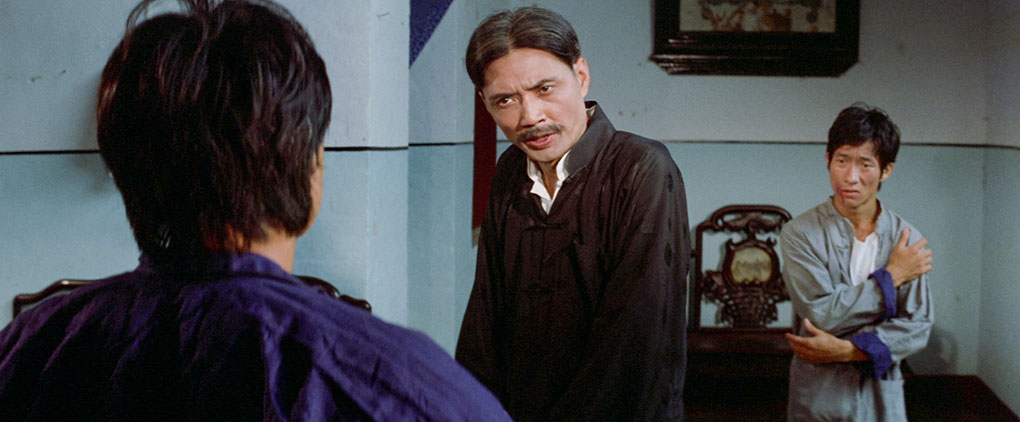
We’re then transported to another location, where several individuals are quietly transporting goods in barrels attached to carrying poles, unspecified commodities whose illegality is established by the way they silently sneak past a uniformed guard. They’re led by a man named Diao Gui (Ma Chien-tang) and are delivering the supplies to local gangster Lei Biao (Li Min-lang), who, it turns out, is the master of the North Gate Village martial arts school, and we know he’s a bad guy because he smokes cigarettes through a cigarette holder. He plans to ship these wares from the dock in the distantly located Dragon Village in Fuquan, and asks Diao if he knows anything about the area. He doesn’t, but he just happens to be friends with the head of the Fuquan Martial Arts Association, He Rong (Chu Mu), a name that in English feels a feel a little on the nose for a bad guy. The corrupt Rong is using his position to extort protection money from the poverty-stricken locals, a task supervised by his cocksure son Ha Da-yong (Choi Sui-cheng), who a short while later is shown attempting to sexually abuse the pretty daughter of one of their victims while his accomplice violently slaps her elderly mother around the face. When the woman’s son returns home and attempts to intervene, they viciously beat him up too. Da-yong even lets out an evil cackle as he first approaches the daughter. Yeah, I think we’ve established who the villains are here.
Diao pays Rong a visit and assures him that if he cooperates with Lei Biao, his protection money racket will be even more profitable. Rong is fine with that idea but warns that the annual kung fu arts tournament is about to begin, and if the North Gate Village is defeated, his position as the village figurehead and Head of Security will be at risk. Da-yong tells him not to worry and arrogantly proclaims that no-one can beat him, but Rong remains concerned about the threat posed by the Dragon Village protégé Lin Zhi-gang, a man Da-yong only beat the previous year because Rong bribed the referee. When Rong suggests taking the Dragon Village boys out of the picture, Dioa responds by taking a couple of his boys to the Dragon Village school, smashing up their sign (a cardinal sin in martial arts movies), beating up Jun Ping and assaulting Zhuang in a manner that triggers his heart condition and leaves him on the floor clutching his chest in pain. The smiling interlopers then depart, leaving the injured Dioa to stumble to the woodland training area and urge his comrades to hurry to the school, where the weakened but stable Zhuang reaffirms how important it is for the people of the district that his students win the kung fu tournament and depose the corrupt Rong.
Shaolin Boxers was made during a period of transitional uncertainty for Hong Kong martial arts cinema, when the two biggest studios, Golden Harvest and Shaw Brothers, were engaged in a desperate search for a new genre star to fill the void created by the recent and untimely death of Bruce Lee. This resulted in the promotion of a whole string of would-be Lee lookalikes with sometimes similar stage names, such as Bruce Li, Bruce Le, Bruce Lai, Bruce Ly, Lee Bruce, and, well, you get the idea. At the same time, the studios were promoting talented character actors and supporting players to lead roles in the hope that one would prove a hit with an expectant public. One such individual was James Tien, an experienced and talented martial artist whose previous genre film work had included supporting roles in Bruce Lee’s breakthrough features, The Big Boss (Tang shan da Xiong, 1971) and Fist of Fury (Jing wu men, 1972). Tien certainly makes for a solid enough lead, but his lack of star charisma results in him feeling less like an emerging new star than a key member of a serviceable ensemble. He’s joined on this score by Li Min-lang as the enjoyably skilled and villainous Lei Biao, the also talented but even more uncharismatic Lee Tin-ying as Shao Xiong, and Hon Kwok-choi as Jun Ping, whose comic bumbling shouldn’t take away from the fact that he’s also a fighter of considerable skill.
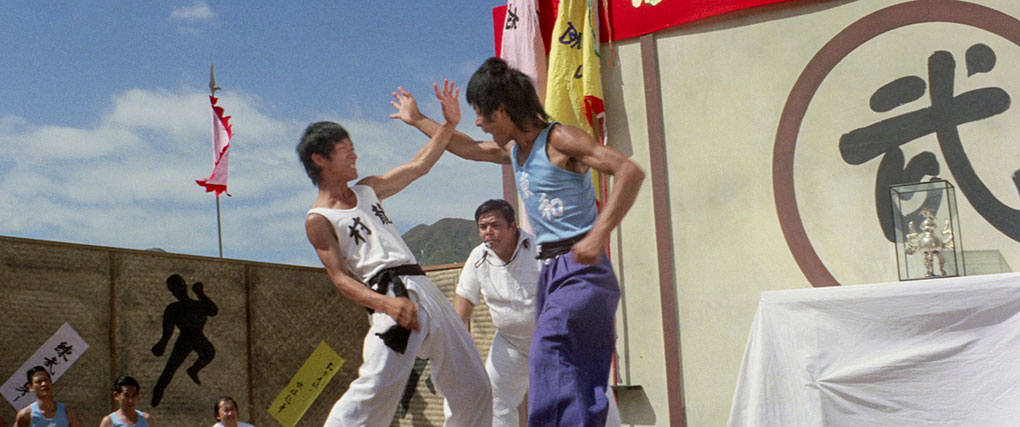
Tune in to the commentary tracks and you’ll hear all three contributors refer to this film as a “basher,” a term coined by martial arts movie afficionados to describe films whose choreographed fights adhere to no particular style and tended to revolve around punching, kicking and blocking. I noted above that the plotlines of martial arts movies exist primarily to move the characters from one fight to the next, and that’s especially true of basher films, and if you know your genre movies then the above plotline should tick a whole series of boxes without adding anything new to the list. That said, it doesn’t always unfold with the clarity that the above outline might suggest, and on my first viewing I found myself having to either speculate or retrospectively join the narrative dots to make sense of what was going on and who exactly was who. There are also some moments of questionable character logic, as when Shao Xiong skips out of the tournament just minutes before he is due to fight to run a kilometre or so to rescue his sex worker girlfriend Cui Ying, despite the importance of winning this competition having been impressed on him and his fellow students by his ailing father. His theory – one he shares with Ying in a “wait, what, who is this now?” woodland meeting with her – is that everyone will be distracted by the tournament once it gets under way, allowing him to sneak into the enticingly named Deep Fragrance Brothel and spirit her away. Unfortunately for him, when he arrives at the brothel, he discovers that the wealthy merchant to whom Cui has been promised is none other than Lei Biao, a fighter of considerable skill and experience who ensures that the overpowered Shao is eventually forced to flee at high speed and empty handed. Even if he had been successful, however, his absence could have allowed the North Gate school to win by default, and the day is only saved when Jun Ping steps up to take his place and wins the match, as much due his opponent’s recklessness as his own undeniable skill.
Ultimately, however, this is all of little consequence to us fans of the basher sub-genre, as we don’t buy our tickets for the drama but the combat scenes that are the film’s raison d’être, and on that score, Shaolin Boxers really delivers the goods. There’s nothing overly flashy about the fights here, but the non-specific punch-kick-block-dodge style employed by the fighters is smartly choreographed and performed with real gusto and skill. Being an old-school kung fu film, the fights are also smartly filmed by director Ta Huang and cinematographer Wong Ta-lung in a manner that showcases the skills of the performers, intermittently shifting style to include handheld shots from the viewpoint of the fighters and lower angle footage that observe the tournament battles from the perspective of the audience of locals. Also of note is the work of editor Wang Keng-sheng, who further ups the pace of the combat without resorting to a dizzying blizzard of multi-angle cuts, and pulls off some masterful match-cut transitions and crosscuts excitingly between the dual battles that unfold during the film’s climax.
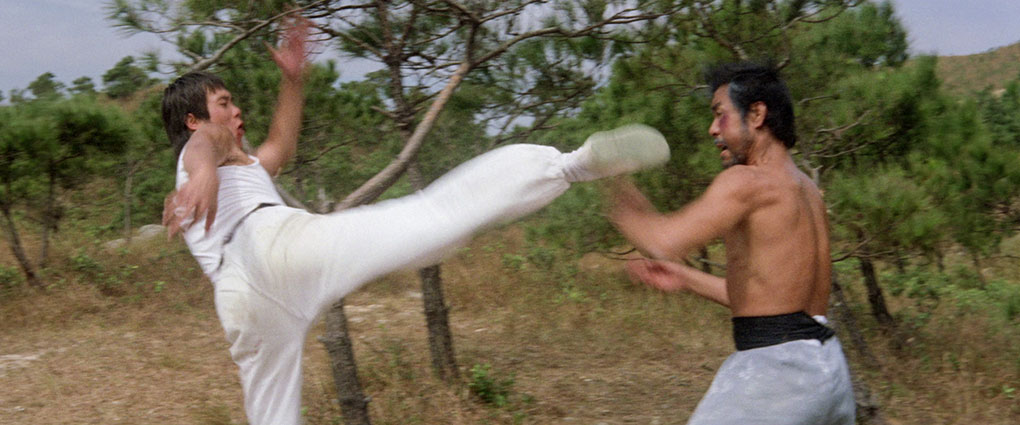
There’s an argument to be made that by devoting a good half of his film to combat, Huang risks spreading the basher fighting style a little thin, which may well have been a contributory factor to the film’s unusually short running time (just 79 minutes) and a climactic clash between Zhi-gang and Lei Biao that repeatedly switches location and seems to take place over the course of a couple of kilometres. The fact that Zhi-gang keeps pausing the fight to flee to a new location and continue the battle there may seem like a contrivance to add a little variety to this lengthy climactic fight (that’s certainly a viewpoint expressed in the commentary tracks), but there is a character-based logic to this move. For all his skills, Zhi-gang is no match for the far more experienced Lei Biao, and every time he realises that he is outmatched, he opts to make a strategic retreat, only re-engaging with his opponent when he’s forced to do so or he feels ready to take him on again. This also explains why he twice hides from Biao and uses improvised weapons to ambush him, and why Biao is able to confidently hold his own even when Shao Xiong shows up to assist his comrade.
Shaolin Boxers is a prime example of the many oft-forgotten Hong Kong martial arts movies made in the wake of Bruce Lee’s death in the hopeful search for a replacement star. It plays almost quaintly safe with a narrative that even by this stage held few surprises, and although the seriously nifty cinematography and editing give the feel of a primo production, the oddly small size of the crowd at what is supposed to be a crucial tournament for the region suggests the budget didn’t stretch to hiring that many extras. Of course, this matters little in a film whose dramatic interludes exist solely to provide motivation for the characters to do battle with each other, and while a select few may critique the lack of a formal fighting style, this is just the sort of no-nonsense, energetic punchy-kicky combat that got me so obsessed with this genre as a young teenager. For all its faults, Shaolin Boxers is a solidly made movie with a ton of sharply choreographed and furiously performed fight scenes. As for James Tien, although a fighter with some serious skills, he didn’t have the on-screen charisma required of the new leading man for which the studios were so eagerly searching. They found him four years later when another former supporting player named Jackie Chan – who was also at one point unsuccessfully promoted as the new Bruce Lee – took the genre in a whole new direction with a little film titled Snake in the Eagle’s Shadow (Se ying diu sau, 1978).
I can’t say for sure, but I have a suspicion that this new Eureka Blu-ray may be first official release of Shaolin Boxers in the UK. I could be wrong here, as I’m sure Eureka would have included this fact in its press release if it was sure this was the case, but I don’t recall it getting a UK cinema release back in the day, and have so far seen no evidence that it was previously released on either DVD or VHS, at least officially, making this new Eureka Blu-ray release particularly welcome. Sourced from a new 2K restoration, the 2.35:1 transfer here is well up to the high standard of previous Eureka martial arts releases, boasting well-graded contrast with solid black levels, a pleasing colour palette that’s free of age-related tints, and a consistently crisp image with well-defined detail. Any traces of former wear and dirt have been cleaned up. Very nice.
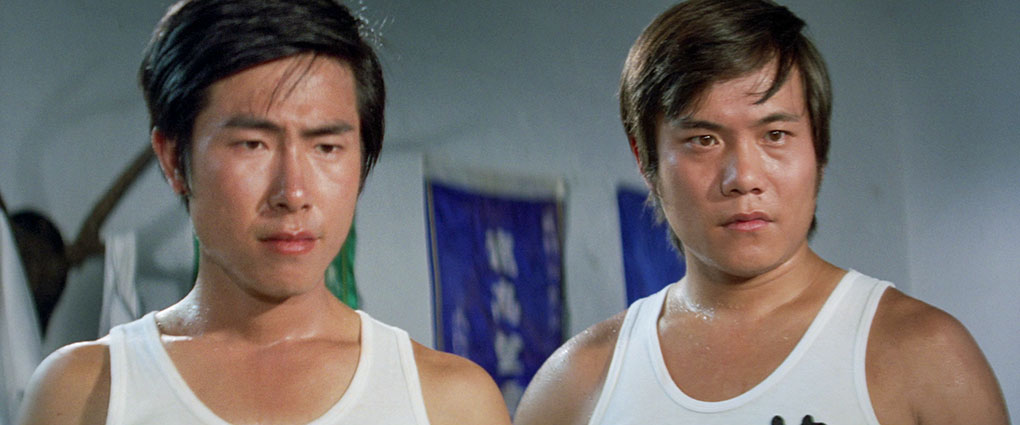
The original Mandarin language track is reproduced here in Linear PCM 2.0 dual mono, and although subject to the expected tonal range restrictions, it’s in better shape than a fair few of its contemporaries. The dialogue is certainly clear, the contact thumps have a degree of wallop, and the music is more lively than I would normally expect of a Hong Kong genre film of this vintage. There are no obvious traces of any former wear or damage.
Also included is the English language dub, which is also Linear PCM 2.0 mono and of a similar audio quality to the Mandarin track, albeit with a slight uptick of the bass in some of the contact blows (I have to admit that prefer the Mandarin track on this score). It’s actually not that bad as these things go, as although the substitute voices for the principal villains feel almost like those overdubs you get on documentaries on non-English language interviews, the individuals voicing Zhuang Tai and Shao Xiong do a solid job, and many of the supporting cast are decently handled.
Optional English subtitles kick in by default when you select the Mandarin track, and if you watch the English language dub, optional English subtitles occasionally appear to translate the text on signs and banners.
Audio commentary with Frank Djeng
Eureka martial arts movie regular Frank Djeng this time goes solo for a typically detailed look at the only film on which Huang Ta is the credited director. He clarifies what constitutes a “basher” movie, notes the visual cues that indicate when the film was set, reveals that he was at school with actor Chu Mu’s son and that he was “a bit of a spoiled brat,” makes an intriguing point about how the censorship of the word “motherfucker” in Hong Kong cinema is dependent on the language in which it is delivered, and explains why it is considered career suicide for an actress to do an even partially nude scene in Chinese films. I learned here that the word “Shaolin” has been copyrighted by the Shaolin Temple, that permission and payment is required for its use in any film, and that Stephen Chow completely ignored this when making his 2001 Shaolin Soccer, and when a delegation from the temple was flown to Hong Kong to negotiate an appropriate fee, he simply refused to meet them. As ever, there is plenty of info on the actors, cultural elements that might pass us western viewers by are handily explained, and Djeng says of the combat, “this is not elegant fighting…it’s almost like open freeform boxing, but that’s how basher fans like it.” No argument here.
Audio commentary with Mike Leeder and Arne Venema
The dynamic duo of Big Mike Leeder and Arne Venema kick off this lively chat with comments about the evolution of the Golden Harvest logo before suggesting that James Tien looks out of his depth in this movie, and that the shortness and sometimes choppy narrative of the film almost suggests that there’s a reel missing somewhere. They describe the story as a mix of kung fu tournament film and family tragedy drama, speculate on whether the only twice credited screenwriter Huang Tien wrote other films under a pseudonym, point out that the referee’s clothing at one point is way too modern for the period in which the film was set (and it really is), and educate us about Beimo, illegal rooftop fights in which martial artists tested their skills in the 1950s and 60s. They provide information on the actors, cinematographer Huang Ta-lung, shooting nude scenes in Hong Kong, and reveal that filmmakers would hire real sex workers to play such roles on screen as it would be damagingly shameful for established actresses to do so. There’s loads more here, and as ever these two are great fun to listen to.
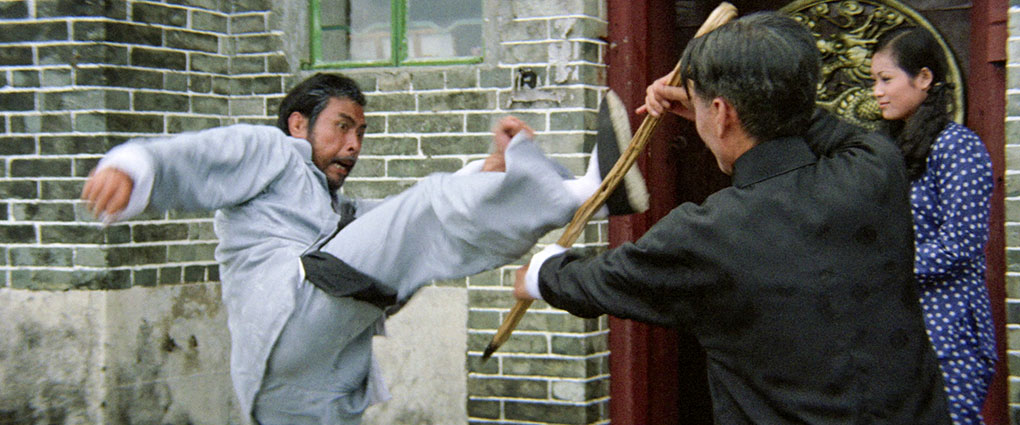
Shaolin Style(16:50)
A newly shot interview with the editor of Martial Arts Studies, Wayne Wong, in which he discusses Shaolin Boxers, lead player James Tien, fight choreographer Ching Siu-tung, the scrabble to find a new star to fill the hole left by the loss of Bruce Lee, and more. He outlines the socio-political undertones of the story, notes that it is more traditional than the more rebellious Bruce Lee films, provides some useful background on the development and importance of the real-life Fuquan trading port, and explains why the film goes back to basics in its plotting whilst also highlighting areas in which he believes it was innovative.
Theatrical Trailer (3:33)
The original Hong Kong trailer is all about the action, with only a brief snippet of dialogue and most of the fighting accompanied by music. It also includes a mother of a spoiler by showing the conclusion of the climactic fight, for pity’s sake. The dialogue is translated by more recently added (and fixed) English subtitles.
Booklet
Aside from the usual viewing advice (there surely can’t be many film fans who do not realise by now why those black bars are on the top and bottom of the picture) and the expected credits for both the film and this disc, this booklet houses just a single essay, but it’s an interesting one in which independent film scholar Aaron Han Joon Magnan-Park looks at the career of lead actor James Tien and his role in Shaolin Boxers. As ever, the booklet is well produced and handsomely illustrated with promotional stills and artwork.
A solid old school basher with a by-the-numbers plot but a walloping amount of smartly shot, edited, choreographed and performed martial arts combat, one that may have failed to make a superstar of James Tien but still impressively showcases his skills as fighter. Eureka has been doing a tremendous job with these Blu-ray restorations of classic era kung fu movies, films that just a few years ago we never dreamed we’d see looking this good, and Shaolin Boxers is well up to the label’s high standard. A fine restoration and HD transfer is coupled with small but targeted collection of top quality special features, making this an easy recommendation for fans of the genre.
|